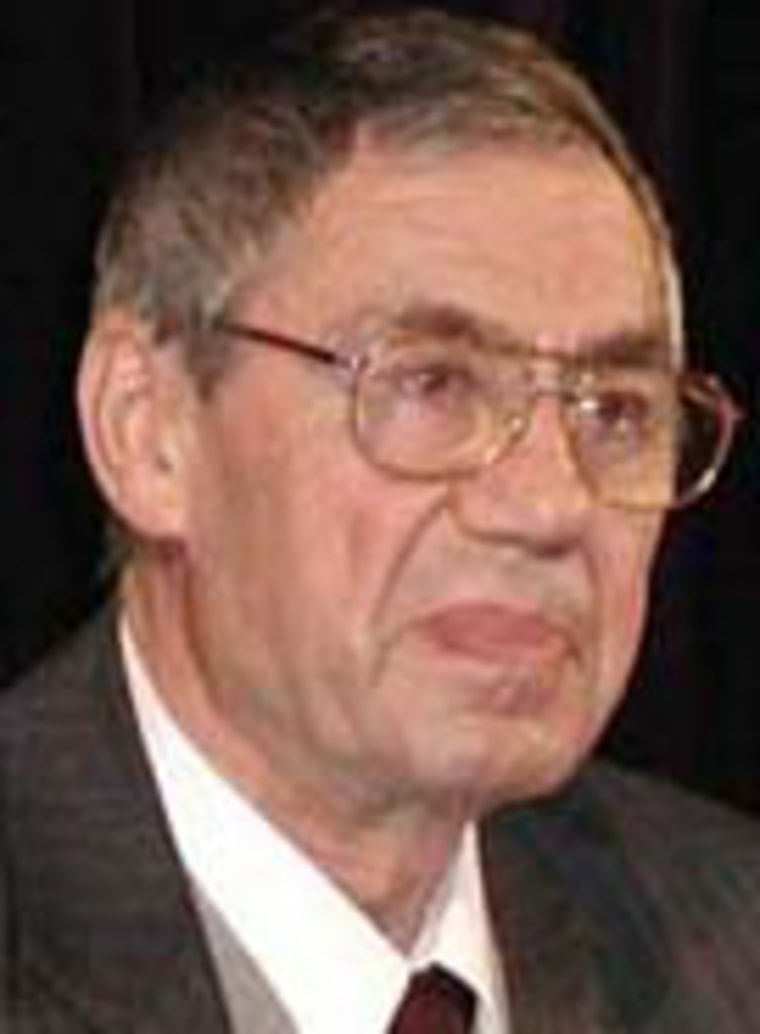A renegade Russian arms expert has splashed cold water over his own country’s concerns about potential U.S. space weapons.
Only a day after Russian Defense Minister Sergei Ivanov appeared to threaten a response to any U.S. effort to put weapons in space, Maj. Gen. Vladimir Dvorkin, a senior scientist at the Russian Academy of Sciences’ Center for International Security, told journalists that such a reaction was unnecessary because “in the near future as there are no such projects in the world.”
The tone of Dvorkin's comments is in contrast to Ivanov's statement, which was made in Kazakhstan on Thursday during ceremonies marking the Baikonur Cosmodrome's 50th anniversary. "If some state harbors plans to deploy weapons in space or starts doing this, we will certainly take measures in response to this," Ivanov said.
Dvorkin pooh-poohed ideas that have surfaced in Western news media, to the effect that the U.S. Air Force wanted the White House’s permission to put weapons into orbit in order to strike targets on the ground.
"The U.S. that ranks top in terms of being capable of attacking objects on Earth from space with special ammunition is not considering such a project even virtually now," Dvorkin said Friday. "There are too many technological and scientific problems to put such a plan in action."
Space policy analyst Dwayne Day agrees. Writing last month in The Space Review, he explained: “A small segment of the Air Force space leadership has always been in favor of unrealistic space weaponry, but is rarely able to convince anybody at higher levels that it is necessary. Unfortunately, a lot of people outside of this community fall for the rhetoric with regularity. The press reports these speeches and the occasional wild study as if they represent real Pentagon plans.”
Dvorkin explained that it still was an open question whether such space-to-ground weapons were more cost-effective than air-launched precision weapons or homing ballistic missiles with conventional warheads. "I believe that the U.S. has got too much stuck in its non-operating missile defense system to take up a new illusory project," he joked.
History lesson on space weapons
Dvorkin also took aim at Ivanov’s declaration of Russian innocence on the issue of space weapons in the past.
Ivanov had declared that "Russia's position on this issue has not changed for decades: We are categorically against militarizing outer space."
But Dvorkin drew attention to past Soviet-era space weapons. “One might remember Soviet anti-satellite spacecraft that were capable to close in on unfriendly satellites and kill them,” he said. These were space-to-space combat systems, operating from orbit — unlike other anti-satellite weapons, such as a U.S. system that involved basing a missile on Earth and firing it into space. The Soviet system, considered a genuine space weapon, had the potential to operate anywhere in near-Earth space that its booster rockets could send it.
The United States did not feel required to build a corresponding space-to-space weapon at that time — nor, Dvorkin argued, would the appearance of a similar U.S. system today require Russia to build one in response. “Russia is not the USSR,” he said, “and the U.S. is not an adversary, but on the contrary a partner in the war on terror.”
“It goes without saying that one should be ready to respond to attacks from a equal rival adequately, to say nothing of a rival that is more powerful,” he said. “However, it does not mean that one should react in such a way to each mass media report of U.S. non-existent military projects."
Day reached the same conclusion about the original newspaper article: “The reporter made a classic mistake of equating military space hyperbole with real plans,” he wrote. The space-to-ground attack systems “are not going to become operational space weapons in the next several decades, and possibly not ever.”
Marching to the beat of a different drummer
Dvorkin, an experienced military strategist who once headed the Defense Ministry’s 4th Scientific Research Institute, is now the chief scientific associate of the Center for International Security, a research center attached to the Institute of Global Economics and International Relations of the Russian Academy of Sciences in Moscow. He has been making big waves in recent years with public pronouncements about Russian strategic policies.
Two months ago, when Ivanov threatened to withdraw from a strategic arms control treaty in order to pressure the United States, Dvorkin was dismissive.
“It is difficult to call Sergei Ivanov's proposal to withdraw from the INF Treaty anything other than inept diplomacy,“ he told journalists. A month later, he came under heavy press criticism for his proposal to eliminate the nuclear triad — the three independent legs of nuclear strike forces — and reorient Russian military aviation entirely to non-nuclear missions. He proposed focusing on land-based ICBMs and reducing nuclear missile submarines.
He made more enemies just last week when he criticized the overlapping Russian bureaucracies charged with controlling nuclear proliferation, and called for the establishment of one U.S.-Russian common body with authority to force coordination.
"About 10 Russian ministries and agencies, ranging from the Defense Ministry's 12th directorate to the Federal Space Agency, are responsible for the Global Partnership Program,” he complained. “And it is common knowledge that too many cooks spoil the broth.”
James Oberg, space analyst for NBC News, spent 22 years at the Johnson Space Center as a Mission Control operator and an orbital designer. He is also an expert on the Russian space program and author of the book "Star-Crossed Orbits: Inside the U.S.-Russian Space Alliance."
